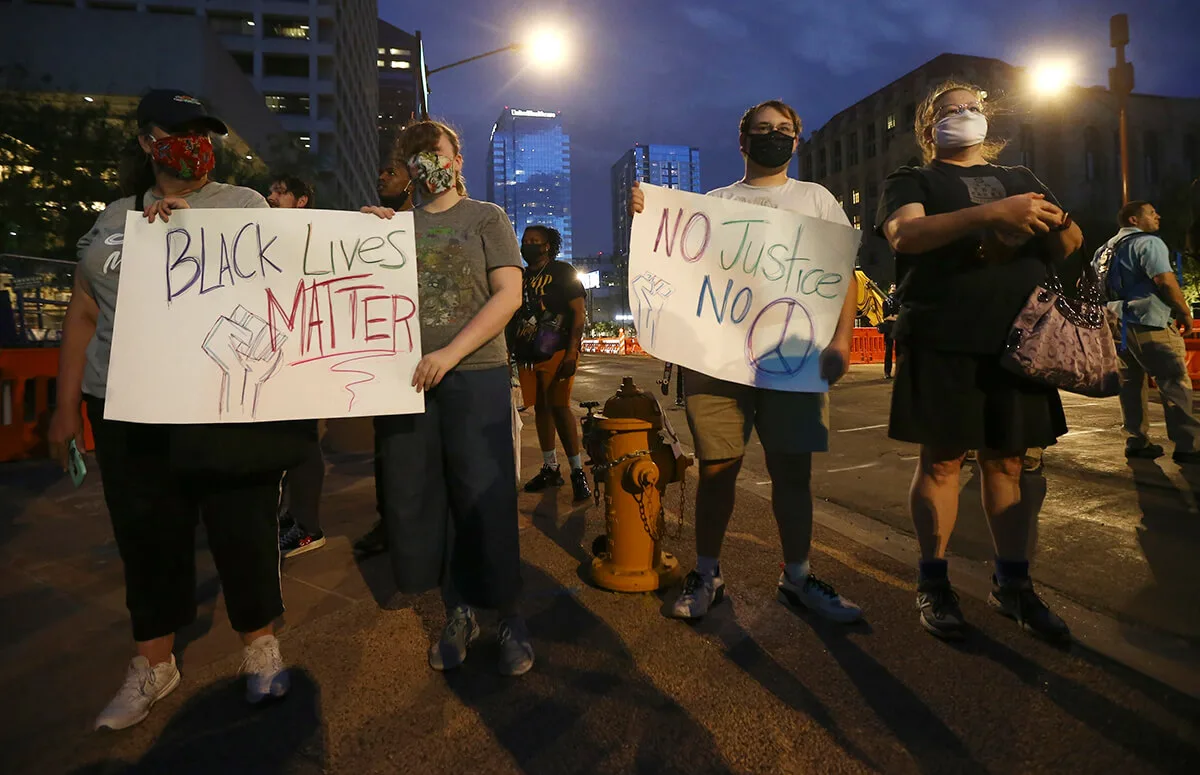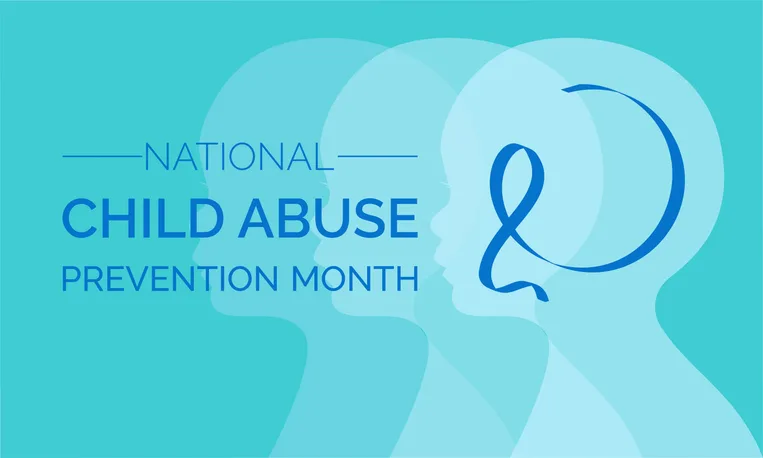
Protesters gather in front of Phoenix City Hall, Saturday, May 30, 2020, in Phoenix while protesting the death of George Floyd, a handcuffed black man who died in Minneapolis police custody on May 25. (AP Photo/Ross D. Franklin)
Phoenix police shot at more people in 2018 than police in New York City, a place with 7 million more residents.
Protests demanding justice in the police killings of George Floyd in Minneapolis and Dion Johnson in Phoenix have sparked calls from thousands of Phoenix residents to defund the city’s police department in favor of community-oriented services.
In the wake of those calls for change, the Phoenix City Council voted Monday to fully fund civilian oversight programs approved earlier this year, while leaving the $745 million police budget intact.
RELATED: Phoenix Banks on Pandemic-Related Savings to Fund Civilian Oversight
The move comes after years of heightened police violence in Phoenix. The city had the highest number of officer-involved shootings in 2018, and has historically been one of the worst places in the country for police brutality.
Shot With No Evidence
On May 25, a 28-year-old Dion Johnson was reportedly sleeping in his car alongside Loop 101 near Tatum Boulevard when a Department of Public Safety trooper pulled over to investigate.
Police say a DPS trooper shot Johnson following a struggle, but activists have questioned this account and demanded the release of body camera footage. Police have said there is no footage, as the trooper was not equipped with a device.
The Phoenix Police Department is overseeing the investigation into the shooting. Family members expressed growing frustration that the trooper, who is on paid administrative leave, has not been identified to them. They also believe investigators have not interviewed other potential witnesses, attorney Jocquese Blackwell said.
RELATED: Arizona Attorney General to Ducey: Do Something About Police Reform — Now
“Phoenix police officers aren’t willing to do anything on my behalf,” Dion Johnson’s mother, Erma, told reporters. “They haven’t contacted me. I haven’t heard nothing since the day that it happened.”
Democratic state Rep. Reginald Bolding said he has sent a letter requesting the US Justice Department review the case for possible civil rights violations.
“We believe the actions of these troopers must be looked into. There must be a true external investigation,” Bolding said.
The family is particularly bothered that Johnson was deprived of emergency medical aid for several minutes after he was shot and handcuffed.
Other Problems with Police
The city’s police ended 2018 with its record number of 44 officer-involved shootings, breaking the previous high of 33 in 2013.
Comparatively, in New York City, which has a population of about 7 million more people than Phoenix, police only fired at people 23 times that year.
Beyond the shootings, Phoenix PD has come under fire for the agency’s culture.
For example, the Plain View Project, released in June 2019, revealed nearly 100 current and former Phoenix officers who had made racist, violent, or otherwise offensive posts and comments on their personal Facebook pages.
Some of those posts included references to Black people as “thugs” as well as encouragement to shoot or run over protesters with vehicles.
The department has also been criticized for allowing officers to purge disciplinary measures from their records. The Arizona Republic found that over five years, hundreds of officers have been permitted to wipe out more than 600 acts of wrongdoing.
What Has Changed?
Since 2018’s record high number of officer-involved shootings, the police department has worked to make changes. Chief Jeri Williams commissioned a study from the National Police Federation and Arizona State University to gain insight on why the shootings had increased.
Findings and recommendations from that study led the department to provide all officers on patrol with body cameras, offer mental health crisis intervention training to all officers, and require officers to track every time a weapon is pointed at a person.
Williams ended up firing three officers in October 2019, one for his posts that were revealed in the Plain View Project. Another officer was fired for his handling of a situation involving a Black family accused of shoplifting. The officer screamed and cursed at the man, woman, and two young children, and threatened to shoot them.
The police department didn’t provide an answer as to why exactly the third officer was fired, but he had reportedly been accused of excessive force, sexual harassment and unreasonable search, and he was under a criminal investigation at the time.
Phoenix was able to bring its number of officer-involved shootings down to 15 in 2019 and has had seven so far this year.
RELATED: After Leading the Nation in Police Shootings, Phoenix Police Department Faces Reforms
However, activists have expressed the need for more change and citizen involvement in the city’s law enforcement.
In February of this year, their efforts began to pay off. The Phoenix City Council voted to approve a plan to create a community review board and a civilian oversight office. The newly created Office of Accountability and Transparency (OAT) would create a review board made up of citizens unaffiliated with law enforcement to review reported instances of use-of-force by police.
After hours of heated debate, the city council voted on Monday to provide $3 million in funding for the OAT. While the vast majority of residents who provided public comment asked that the funding come from the police department budget, the department’s $745 million was left untouched.
RELATED: Phoenix Just Voted to Give More Power to Civilians Overseeing Police
Instead, funding for the OAT will come from pandemic-related savings. The city has pledged to use the federal relief funds they will be reimbursed with for the money it paid to employees on coronavirus-related leave. Money saved on services that were discontinued during the pandemic, such as community pools and park maintenance, will also be used to fund the OAT.
The final vote on the city budget will be held on June 17, with the development of the OAT expected to begin later this year.
But while progress has been made in some areas, Black men and women are still dying at the hands of police.
A Nationwide Problem
On the same day Johnson died, another Black man in the U.S. was killed in police custody. A white Minneapolis police officer knelt on Floyd’s neck for nearly 9 minutes, despite Floyd crying out for help and saying he couldn’t breathe.
Officer Derek Chauvin and three others had been called to the scene after a nearby store employee accused Floyd of buying cigarettes with a counterfeit $20 bill.
RELATED: Minneapolis Police Officer Who Killed George Floyd Charged With 3rd Degree Murder
Prior to the incident, Chauvin was the subject of at least 18 complaints within the police department. He has since been fired and charged with second-degree murder, as well as second-degree manslaughter.
Floyd’s death sparked protests across the world and added to the Phoenix community’s outrage over Johnson’s death.
Worries of Further Escalation
Mass protests demanding change have been met with federal and state governmental leaders escalating unprovoked attacks against protesters. About 300 people were arrested in Phoenix during the first weekend of protests.
Gov. Doug Ducey called in the National Guard and imposed an 8 p.m. curfew on the state starting May 31. He allowed it to expire Monday.
But President Donald Trump has criticized governors across the state for being “weak” in the face of unrest, and he pushed them to “dominate” the protests.
Last week, law enforcement deployed flashbangs and sprayed protesters with tear gas before curfew in the nation’s capital so Trump could take a photo in front of a historic church.
“You’ve got to arrest people, you have to track people, you have to put them in jail for 10 years and you’ll never see this stuff again,” Trump said Monday. “We’re doing it in Washington, D.C. We’re going to do something that people haven’t seen before.”
RELATED: Trump’s Former Defense Secretary Mattis: The President Is a Threat to Our Country
Despite violent rhetoric from the White House, protesters have remained undeterred. On Sunday, during the 11th day of marches in Phoenix, organizers held a vigil for Johnson, decorating the fence outside the Arizona DPS offices into a mural, and called for an independent investigation into the shooting.
“We are outraged. We demand that the police report be released. We demand that the officers’ names be released and that the officers involved are fired,” organizers from Black Lives Matter Phoenix Metro posted online. “We demand that Dion Johnson’s belongings be released to his family. It is beyond cruel and disgustingly inhumane to shoot an unarmed civilian, kick him while he’s down, and refuse to administer life-saving measures for over six minutes.”
READ MORE: A CEO, Former Cop, and Mom. Here Are Some of the Arizonans Who Support the Protests.
The Associate Press contributed to this report.
Politics

6 terrifying things that could happen if the Comstock Act is used to target abortion
Does 1873 sound like a really, really long time ago? Well, that’s because it is—but if Republicans and far-right anti-abortion activists have their...

He said what? 10 things to know about RFK Jr.
The Kennedy family has long been considered “Democratic royalty.” But Robert F. Kennedy, Jr.—son of Robert F. Kennedy, who was assassinated while...
Local News

Opinion: Strategies for Child Abuse Prevention
11 ways you can be an ally in the fight against child abuse. April is Child Abuse Prevention Month. In the United States, it is estimated that a...

Biden marks Earth Day by announcing $7 billion in solar grants
The Biden administration on Monday announced the recipients of its Solar For All Program, a $7 billion climate program that aims to lower energy...





